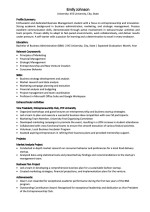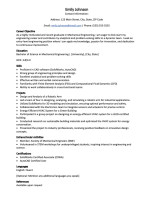Resume with No Experience
Creating a Resume Without Experience
Crafting a resume without any prior work experience can be daunting, but rest assured, it is possible to create an impressive resume that captures the attention of potential employers. Many job seekers find themselves in this predicament, whether they are recent graduates, career changers, or individuals re-entering the workforce after an extended break. This blog will explore effective tips and strategies to create a resume no experience showcasing your potential, skills, and qualifications, even without direct work experience.
It is possible to create a resume without experience!
Before diving into the nitty-gritty details of resume writing, let's establish that creating a compelling no experience resume is possible. While experience certainly provides an advantage, employers value other qualities like passion, drive, and potential. Your resume can serve as a platform to showcase your educational background, relevant skills, achievements, and extracurricular activities that make you a valuable candidate.
Tips for creating a resume with no experience
Highlighted below are tips on how to write a resume with no experience:
- Add education and courses to your resume: Begin your resume by highlighting your educational qualifications, including your degree, major, and academic achievements or honors. If you have taken courses or certifications relevant to the job you're applying for, list them too. Education can demonstrate your commitment to learning and your ability to acquire new knowledge.
- Demonstrate relevant skills and achievements: While you may lack work experience, focus on the skills acquired through your education, internships, volunteer work, or personal projects. Communication, problem-solving, leadership, and teamwork are valuable in almost any job. Additionally, highlight any achievements or awards that showcase your dedication and abilities.
- Add internship experience and volunteer work: In your first job resume, include any internships you've participated in, volunteered for, or completed freelance projects. These experiences may not be traditional jobs, but they demonstrate your initiative, work ethic, and practical skills. d. Use verbs and keywords: When describing your experiences and skills for a resume with no experience, use strong action verbs and relevant keywords to catch the employer's attention. For example, instead of saying "worked on a project," use "collaborated on a team project to achieve XYZ results."
- Add a cover letter: Always include a personalized cover letter with your resume. A well-crafted cover letter allows you to explain your passion for the position, how your skills align with the job requirements, and why you are an ideal fit for the company.
- Professional resume design: Ensure your resume has a clean and professional design. Use an easy-to-read font, organize your information logically, and make sure the formatting is consistent. Avoid using too many fancy graphics or colors, distracting your qualifications.
Resume Examples Without Experience
An example of an entry-level resume:
Good luck with your job search!
An example of a student's resume

Good luck with your applications!
Mistakes to Avoid When Creating a Resume Without Experience
- Remove irrelevant information: Avoid including irrelevant personal details, such as your height, weight, or marital status. Also, exclude any work experiences or skills unrelated to the job you're applying for, as they can clutter your resume and distract employers.
- Do not write general summaries: Steer clear of generic objectives or summaries. Tailor your objective or summary of the job you're applying for, demonstrating your enthusiasm and passion for the role.
- Inability to adapt resume to work: Each job application is unique, so customize your resume for each position you apply to. Analyze the job description and align your skills and experiences with the job requirements.
- Making spelling and grammar mistakes: Spelling and grammar errors can make a negative impression on potential employers. Always proofread your resume carefully or ask someone else to review it.
Conclusion
Creating a beginner resume without experience might seem challenging, but it's a chance to showcase your potential, enthusiasm, and transferable skills. By emphasizing your education, relevant experiences, and achievements and avoiding common mistakes, you can craft a resume that impresses recruiters and increases your chances of landing your dream job. Remember to tailor each resume to the specific job you're applying for, and don't forget to include a well-crafted cover letter to personalize your application.
FAQs
Q1. How can I showcase my skills and qualifications without work experience?
You can highlight your educational achievements, relevant coursework, internships, volunteer work, and extracurricular activities to demonstrate your skills and qualifications. Use your resume to showcase projects you've worked on, leadership roles you've held, and any awards or honors you've received.
Q2. What format should I use for my resume without work experience?
Use a functional or combination resume format for a first resume without work experience. These formats focus on skills and achievements rather than work history, allowing you to draw attention to your capabilities.
Q3. Should I include a cover letter?
While not mandatory, a cover letter allows you to express your enthusiasm for the position and company and elaborate on how your skills align with the job requirements. Include a cover letter tailored to each application for a personalized touch, if possible.
Related articles:
-
Seven Tips for the Perfect Resume Photo
-
How to Present Skills and Competencies in Resumes?
-
The Most Common Resume Mistakes to Avoid
-
The Specifics of a Career Change Resume
-
Top 10 Things Recruiters Look for in Resumes
-
Update Your Resume after a Long Career Break
-
What Defines a Great Business Resume?
-
What Resume Format Looks Better in 2023?
-
Words to Use and to Avoid in Your Resume
-
Top Resume writing and career development tips
-
How Do CVs Differ From Resumes?
-
Should You Pay Someone To Write Your Resume/CV?
-
10 Tough Nursing Interview Questions
-
Reasons to Send Follow-Up and Thank-You Letters?
-
When to Send a Thank You Letter After Interview?
